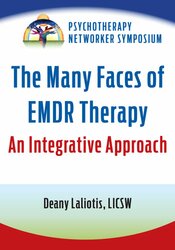
×

People don’t often think of EMDR as psychotherapy. But these two paths to healing can coexist. So how do we reconcile EMDR therapy as a breakthrough treatment for PTSD and an attachment-based psychotherapy approach? Whether your client is struggling with a major single PTSD event or ongoing issues with self-esteem and relationships difficulties, the root cause is the same—memory, which informs our present-day experience. Through videotaped illustrations of actual clients, you’ll learn about the different ways EMDR can be applied to treat disturbing life experiences that have a lasting impact, and how the psychotherapy of EMDR can transform life-long difficulties with self and others, resulting in a more authentic sense of sense of self. You’ll discover:
All members of the PESI, Inc. planning committee have provided disclosures of financial relationships with ineligible organizations and any relevant non-financial relationships prior to planning content for this activity. None of the committee members had relevant financial relationships with ineligible companies or other potentially biasing relationships to disclose to learners. For speaker disclosures, please see the faculty biography.
Continuing education credit information is coming soon for this non-interactive self-study package.
CEs may be available for select professions, as listed in the target audience. Hours will be dependent on the actual recording time. Please check with your state licensing board or organization for specific requirements.
There may be an additional fee for CE certificates. Please contact our Customer Service at 1-800-844-8260 for more details.
**Materials that are included in this course may include interventions and modalities that are beyond the authorized practice of your profession. As a licensed professional, you are responsible for reviewing the scope of practice, including activities that are defined in law as beyond the boundaries of practice in accordance with and in compliance with your professions standards.
| File type | File name | Number of pages | |
|---|---|---|---|
| Manual - The Many Faces of EMDR Therapy (1.4 MB) | 36 Pages | Available after Purchase | |
| Manual - The Many Faces of EMDR Therapy - French (1.4 MB) | 36 Pages | Available after Purchase | |
| Manual - The Many Faces of EMDR Therapy - Italian (1.4 MB) | 36 Pages | Available after Purchase |

Deany Laliotis, LICSW, is a world-renowned trainer, consultant, and clinician in EMDR therapy. She's authored several book chapters and articles on EMDR therapy and is the Founder and Director for The Center for Excellence in EMDR Therapy, Inc., in Washington, DC.
Speaker Disclosures:
Access never expires for this product.
For a more detailed outline that includes times or durations of time, if needed, please contact cepesi@pesi.com
Visit our FAQ page at https://www.pesicanada.ca/faq or contact us at https://www.pesicanada.ca/contact-us.
| 5 |
|
| 4 |
|
| 3 |
|
| 2 |
|
| 1 |
|
Satisfaction Guarantee
Your satisfaction is our goal and our guarantee. Concerns should be addressed to info@pesicanada.com.
Please wait ...